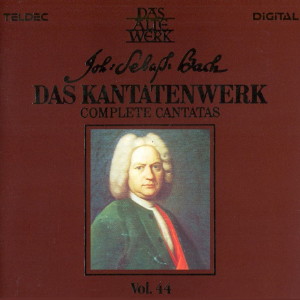 |
|
2 LPs
- 244-193-1 EX - (p) 1989
|
 |
| 1 CD -
244-193-2 ZK - (p) 1989 |
|
| DAS KANTATENWERK - Volume 44 |
|
|
|
|
|
|
|
| Johann Sebastian
BACH (1685-1750) |
Kantate
"Dern Gerechten muß das Licht immer
wieder aufgehen", BWV 195
|
|
18' 52" |
|
|
Trauungskantate
|
|
|
|
|
Textdichter
unbekannt; 1. Psalm 97, 11-12; 6. Paul
Gerhatd 1647
|
|
|
|
|
Solo:
Sopran, Alt, Tenor, Baß - Chor; Tromba I,
II, III; Corno I, II; Flauto traverso I,
II; Oboe I, II; Oboe d'amore I, II;
Timpani; Violino I, II, Viola; Continuo
(Violoncello, Violone, Organo)
|
|
|
|
|
Vor
der Trauung
|
|
|
|
|
- 1.
Chor: "Dem Gerechten muß das Licht"
|
5' 24" |
|
B1 |
|
- 2.
Recitativo (Basso): "Dem Freudenlicht
gerechter Frommen" |
1' 19" |
|
B2 |
|
- 3.
Aria (Basso): "Rühmet Gottes Güt' und
Treu!" |
4' 20" |
|
B3 |
|
- 4.
Recitativo (Soprano): "Wohlan, so knèpfet
denn ein Band" |
1' 15" |
|
B4 |
|
- 5.
Chor: "Wir kommen deine Heiligkeit" |
5' 51" |
|
B5 |
|
Nach
der Trauung |
|
|
|
|
- 6.
Choral: "Nun danket all' und bringet Ehr" |
0' 43" |
|
B6 |
|
|
|
|
|
Jan
Patrick o'Farell (Solist des Knabenchores
Hannover), Sopran
René Jacobs, Alt
John
Elwes, Tenor
Harry van der Kamp, Baß
Knabenchor Hannover |
Heinz Hennig, Leitung
Collegium Vocale Gent | Philippe
Herreweghe, Leitung
LEONHARDT-CONSORT mit
Originalinstrumenten
- Friedemann Immer, Klaus Osterloh, François
Petit-Laurent, Trompeten
- Friedemann Immer, Klaus Osterloh, Hörner
- Ricardo Kanji, Marten Root, Flöten
- Ku Ebbinge, Michel Henry, Oboe und
Oboe d'amore
- Michael de Roo, Pauken
- Alda Stuurop, Marinette Troost, Antoinette
van den Hombergh, Lucy van Dael, Marie
Leonhardt, Violinen
- Staas Swiestra, Ruth Hesseling, Violen
- Richte van der Meer, Wouter Möller, Violoncelli
- Anthony Woodrow, Violone
- Bob van Asperen, Cembalo
Gustav Leonhardt, Gesamtleitung
|
|
|
|
|
Luogo
e data di registrazione |
|
Lutherse Kerk,
Haarlem (Holland) - Gennaio 1988
|
|
|
Registrazione: live
/ studio |
|
studio |
|
|
Producer |
|
Wolfgang Mohr
|
|
|
Recording
Producer
|
|
Friedemann
Engelbrecht
|
|
|
Sound Engineer
|
|
Michael Brammann
|
|
|
Prima Edizione LP |
|
Teldec "Das Alte
Werk" | 244 193-1 EX | 2 LPs -
durata 31' 20" - 39' 21" | (p)
1989 | DIGITAL DMM
|
|
|
Edizione CD |
|
Teldec Classics |
LC 6706 | 244 193-2 ZL | 1 CD -
durata 70' 41" | (p) 1989 | DDD |
|
|
Cover
|
|
Johann Sebastian
Nach, einige Jahre vor seiner
Ernennung zum Kantor in Leipzig.
Gemälde con JJ. Ihle (1720) Bach
Museum Eisenach.
|
|
|
Note |
|
In questo volume sono
presenti anche La Cantate BWV 192
e BWV 194 a cura del Concentus
Musicus Wien diretto da Nikolaus
Harnoncourt.
|
|
|
|
|
INTRODUCTION
by Nele Anders
The wedding cantata "Dem
Gerechten muß das Licht
immer wieder aufgehn" (BWV
195) exists in three
different versions, composed
at different times.
Originally composed circa
1727 for "4 \/oci / 3 Trombe
/ Tamburi / 2 Hautbois e /
Flauti / 2 Violini / Viola /
e / Continuo," it was
revised for a repeat
performance circa 1742. A
further performance took
place at some time between
August 1748 and October
1749. For this occasion,
Bach cut movements 6-8, and
added in his own handwriting
and "in the ponderous style
of his old age" (H. J.
Schulze) as a new sixth
movement the two stanzas of
the Paul Gerhardt chorale
"Nun danket all und bringet
Ehr" (1647) to the score,
set to the melody "Lob Gott,
ihr Christen, alle gleich"
(Praise God, O Christians,
one and all). In keeping
with the occasion,
"rectidude" and
"graciousness" are praised,
and Godßs blessing is asked
for the future state of
matrimony. In compliance
with the ceremonial laid
down in the church
regulations, one part (Nos.
1-5) was heard before the
actual wedding, and the
other part (No. 6)
afterwards. The festive
character of the composition
is emphasized by a large
orchestra, two vocal
soloists and the division of
the choir into a solo and a
ripieno choir, while the
aria framed by two
recitatives, with its
catchy, dance-like melody
gives eloquent expression
tothe sense of rejoicing
over the bond of matrimony
now forged.
|
  |
|
|